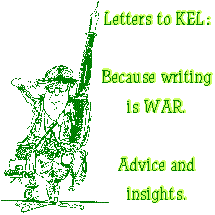Letters to Kel: YOU'RE THE DIRECTOR -- Script to Novel
 Happy Thanksgiving!
Happy Thanksgiving!Are you thankful for your writing gift? If not ... maybe you're not doing it right.
Back to the subject of turning a screenplay into a novel....
One of the first books on screenwriting I read, back in college when I wrote my first screenplay longhand, on notebook paper in a three-ring binder, the book told me NOT to put down any stage directions unless it was absolutely vital to the movement of the story. Such as: "Jake picks up the talisman and puts it in his pocket." And then later, "The demon appears, streamers of evil magic shoot out his fingers and yank Jake through the wall from the next room, as the talisman glows red-hot in his pocket." Kind of vital to the action and the story progression, ya think?
WHY was this rule handed down in all capital letters and bold face? (not really, but I was at the neophyte stage where I memorized any and every rule given me by people with experience)
Because it is the director's prerogative to decide what the characters/actors do, how they react, and to sometimes even put the thoughts and emotions in their heads, affecting how they deliver their lines, how they react to each other, and all the "side business" that they attend to when the camera is focusing on someone else. Essentially living their own characters' lives while the story follows someone else.
But YOU are turning your screenplay into a novel, so now YOU are the DIRECTOR. YOU have the power. YOU know what your characters are thinking, why they have to pick up the gun on page 40 so they have the gun to shoot the terrorist or be caught with it and arrested for carrying a concealed weapon or hit the mugger over the head with it on page 100.
Do you know what your characters are thinking, why they react to the sight of cornbread dripping with maple syrup as if it reminds them of the greatest tragedy of their lives (because it does -- and you need to handle those insights and flashbacks delicately -- another topic)? Do you know what brought a secondary character into town in time to trigger a bar fight that results in the hero being shot so he's in the hospital when his ex-girlfriend -- who didn't tell him she was pregnant -- is rushed to the hospital to give birth?
You better know -- YOU are the DIRECTOR! (And because audiences, by and large, hate "lucky" coincidences.)
And while some directors are such geniuses that they can just wing it, a lot of directors are geniuses because they plan ahead (and then some pretend to just wing it). They think about each character and each scene, and they create background, they know the histories and reasons and feelings and reactions and what chemical reactions will create the bomb blast they need in the climax scene and how the hero can defuse the bomb without any training -- and how to insert that information early in the movie so the audience doesn't say, "Yeah, right, like THAT's believable?" when the hero saves the day.
You need to know these things. You need to plan ahead. You need to have conversations with your characters and get to know them. Whatever it takes. One author said in a workshop that she sits down and has coffee with her characters. She knows them well enough to know who will want plain black coffee and who will want a caramel mocha frappe with extra whipped cream. THAT is when you're ready to be the director and move your characters around like the genius the rest of the world needs to know that you are.
You are the director. Get ready to direct. It's gonna be a great movie -- whether it's on a wide screen or inside your reader's head.
Published on November 27, 2014 02:00
No comments have been added yet.



